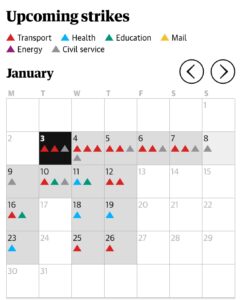After Network Rail’s chief negotiator said a deal was “in touching distance,” Downing Street expressed optimism that a solution to the current wave of rail strikes could be imminent

Fresh talks on the dispute, in which drivers and other staff staged the first of five days of national rail strikes on Tuesday, were expected this week, according to a No 10 source.
While issues remained to be resolved, the source added that the public sector dispute was expected to be resolved first.
Earlier, Network Rail’s chief negotiator, Tim Shoveller, suggested that the pay offer for rail staff would not be improved, but that better communication about the deal would start to win over union members.
“We only need 2,000 people who voted no the last time to change their vote, and the deal will pass,” Shoveller said. On Tuesday, he told BBC Radio 4’s Today programme, “Some members are returning to work, and we are seeing an increase in the number of members returning to work, but that is not the way to resolve the problem or the dispute.”
“What we’re saying to the RMT is that it’s very clear from the referendum that they held – they did it very quickly, it was only open for a few days – that it was rushed, and it didn’t allow and give time for people to ask genuine questions about the reform elements.”
“So, what we’re saying to the RMT is that we know which areas had been misunderstood by some of our staff, their members, and we want to make sure that we can work with the RMT now to make clarifications where there’s been misunderstanding and put the deal out again.”
Members of Network Rail’s Rail, Maritime and Transport (RMT) union and 14 train operators are on strike for two 48-hour periods, beginning on Tuesday and ending on Friday.
With signalling staff among the 40,000 RMT members on strike, much of the railway in Wales, Scotland, and less populous areas of England will be closed, and service frequencies on major routes will be reduced to one train every hour.
There is no timetable for the government’s plans to pass legislation making public sector strikes more difficult, such as imposing statutory minimum service standards for railways.
There really is no timetable for the government’s approach to pass legislation making public sector strikes more difficult, such as imposing statutory minimum service standards for railways.
No. 10 had hoped to do is provide information on this before Christmas, but that is now unlikely even this week, as officials continue to investigate the complexities of the issue.
“We certainly want these new powers in place as soon as possible,” said Rishi Sunak’s official spokesperson. “While I do not have a specific timeline for you, we recognise the importance of this and are working accordingly.”
Rail passengers were advised to travel only if absolutely necessary in advance of the latest strikes.
No. 10 had intended to provide information on this before Christmas, but that is now unlikely even this week, as officials continue to investigate the complexities of the issue.
“We definitely want these new powers in place as soon as possible,” said Rishi Sunak’s official spokesperson. “While I do not have a specific timeline for you, we recognise the importance of this and are working accordingly.”
Rail passengers were advised to travel only if absolutely necessary in advance of the latest strikes.
Aslef general secretary Mick Whelan told PA Media that the union was “in it for the long haul,” adding that “they anticipate train drivers at these businesses to take a real-world pay cut – to work just as hard for significantly less – when inflation is running at north of 14%.”
Mick Lynch, the RMT secretary general, also blamed the federal government for blocking a settlement, and said there was “an unprecedented level of council of ministers interference”.
“We had also started working with the rail sector to reach successful negotiated settlers ever since disinvestment in 1993, and we have achieved deals from across the network in 2021 and 2022 where the Department of Transportation has no involvement.
“Yet, in the this disagreement, there is an extraordinary amount of ministerial interference, which is impeding rail employers from negotiating a package of measures with us so that we can settle this dispute.”
Mark Harper, the Transport secretary, denied that the government had obstructed any path to a settlement. “There is a fair and reasonable pay offer on the table,” Harper told Sky News. There is no bottomless well of taxpayer funds here. Taxpayers have made significant investments in the rail industry in recent years, when it has been hit hard by the flu epidemic when people aren’t travelling.”
